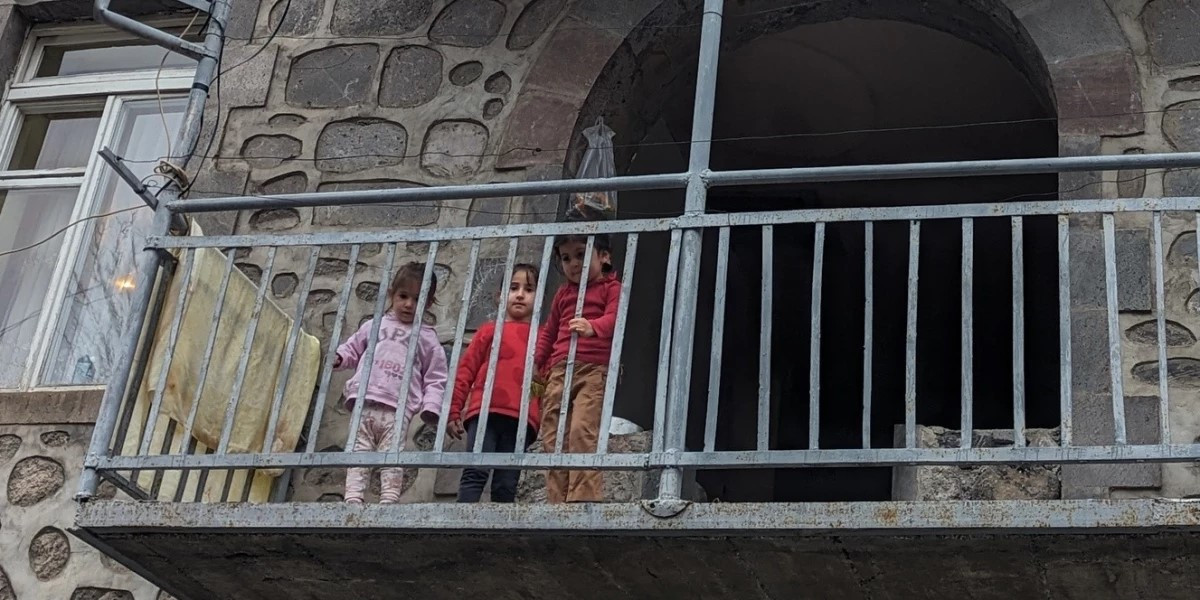Children: Inspiring Lifelong Perseverance
Published: Feb 20, 2024 Reading time: 5 minutes Share: Share an articleThe forced displacement of over 100,000 Armenians from Nagorno-Karabakh has caused several practical problems for the population, which are compounded by the burdensome feelings of loss. People displaced from Nagorno-Karabakh struggle every day to make ends meet and to care for their family needs.

We at PIN continue to support displaced people with various programmes. With United States Agency for International Development (USAID) funding, we helped over 1200 families in the Syunik and Vayots Dzor regions. We provided them with winterisation items, including beds, blankets, pillows, bed linen, towels, warm socks, hats, and scarves.
Through the experiences of Albert, Svetlana, and Narine—and their families—we see the everyday struggles these people must endure because of their displacement.
Albert's Family: Enduring Two Displacements
The joyful sounds of Albert's children playing in the background were an optimistic accompaniment to stories about the dire consequences of displacement from Nagorno-Karabakh. Due to their displacement—a result of the 44-day conflict in 2020 and the September 2023 displacement—two of Albert's four children were born in Goris, Armenia, not in their ancestral Nagorno-Karabakh.
Albert's family hails from Hadrut; they lived in the village of Hartashen. However, due to the 2020 displacement, they temporarily fled to Goris. Then, with the Artsakh Government's help, they returned to Nagorno-Karabakh, settling in the village of Shosh.
Currently, Albert's mother is the only member of the family employed. Back in Nagorno-Karabakh, she was a teacher; here in Goris, she bakes Zhingyalov hats (a traditional Artsakh bread with herbs). Albert's family rents in Goris, and housing is their main concern.
The Unfulfilled Housewarming
"They are our joy", says Svetlana. Little Svetlana, who is named after her, is one-and-a-half years old, and Aleksandr is six months old.
Svetlana is surrounded by her children, daughters-in-law, and two grandchildren. There are 9 people in the family. She has four children; her only daughter suffers a disability from a chronic disease. The difficulties of displacement and loss of home compound her considerable concerns. When Svetlana and her family lived in Martuni, Nagorno-Karabakh, they had a garden in the village, they were engaged in animal husbandry, and the sons had jobs. Today, their dream is to have their own space for living. Due to a lack of job opportunities, they have turned to state and charity support programmes to cover their basic needs. However, things remain uncertain, and their sons are just trying to find jobs.
A free house was offered in Meghri by the Government of Armenia. However, it was insufficient for the needs of Svetlana's disabled daughter. Therefore, the family chose to move to Verishen and pay for housing. However, the connection with the Meghri community has remained strong.
The welcoming ambiance of the experienced teacher's home
Narine is a teacher. She taught Armenian language and literature in Karabakh. Narine now lives in Goris with her husband and four children. The atmosphere of their house is warm, and the table is full of books. While we were talking with Narine, the children were learning the lessons with love and helping each other. Narine also followed the progress of the children's homework. Narine is now the only one at home who works. Her husband wanted to find a job in Goris, but he finds it difficult due to his health status. As with almost all displaced families, Narine's family live in rented accommodation.
Narine's family never imagined that they would stop in Goris. Although the nine-year blockade, the bitter consequences of the war, and the gas station explosion [218 people died, and 120 were injured] left irreversible marks, they are trying to overcome and remain strong, optimistically believing that everything will be settled soon.
Narine, who has years of teaching experience, works as a teaching assistant. The atmosphere is warm and supportive at her school, and she is happy to have the opportunity to work in a supportive environment; she has a great desire to work as a teacher. In addition to the Armenian language and literature, she taught the Armenian church's history in Nagorno-Karabakh and worked in a kindergarten for about 18 years.
These stories were produced within the framework of the "Disaster Risk Reduction for Border Communities in the Syunik Province" project, funded by USAID and implemented by our colleagues in People in Need (PIN) Armenia. Working closely with the municipalities, we focused the project on providing essential winterisation non-food items to the displaced families in the two bordering regions of Syunik and Vayots Dzor. We are assisting the recently displaced families with foldable beds and bedding items—blankets, pillows, bed linen, and essential winterisation clothing – warm socks, hats and scarves, distributing overall 900 beds, 4000 blankets, 3000 bedding sets, 4000 towels, 2000 pairs of socks, 4000 sets of hat and scarves. Moreover, within the framework of the project, five safe spaces were renovated and equipped in the Syunik region.
The contents are the sole responsibility of PIN and do not reflect the views of USAID nor the Government of the United States.



